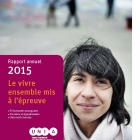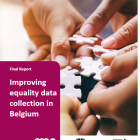Annual report 2020: vulnerable human rights in times of crisis
In this extraordinary year, Unia continued to fight for human rights and equality. The corona pandemic acted like a magnifying glass. Those already in a vulnerable position were often the first or hardest hit by Covid-19 or its measures.
The annual report focusses on inequality in society through two lenses. The first lens is that of prevention. Read more about the partners we work with, the recommendations we make and the training we give in various sectors. This is how we structurally work towards a more equal society
Through the second lens we see how Unia reacts when boundaries are crossed. You can read how we deal with reports of discrimination and how we take action against hate speech and hate crimes. Just like in previous years, the number of reports rose sharply this year, by 11.7% compared to 2019. However, the number of cases opened by Unia on this basis is stabilising. This is partly due to the fact that sometimes dozens, even hundreds of people report the same fact to Unia. The harsh tone on social media continues to increase and the pandemic causes a flare-up of hate speech. Unia therefore continues to argue for the amendment of Article 150 of the Belgian Constitution, so that incitement to hatred never goes unpunished.
Furthermore, you can read extensive analyses in this annual report about diverse subjects such as the impact of the corona crisis on persons with disabilities, discrimination tests on the housing and labour market or multiple discrimination.
Comparable publications
Evaluation of federal anti-discrimination legislation (2017)
Article 52 of the Anti-Discrimination Law states that the application and effectiveness of the anti-discrimination laws must be assessed by the Legislative Chambers. Unia has prepared an assessment report on the Anti-Discrimination Law and the Anti-Racism Law based on its own practical experience, national jurisprudence and its general expertise in the fight against discrimination.
Annual report 2015. Living together put to the test.

The year 2015 left a deep mark on our society. Violent conflicts and tensions on a global scale have had a direct impact on us. As we finalise this annual report, Belgium is suffering the repercussions of the bomb attacks at Zaventem airport and Maelbeek metro station in Brussels.
Diversity Barometer Education (2018)
Unia commissioned a study to be carried out about equal opportunities in the schools in the three Communities in Belgium. The Diversity Barometer Education is the final part of a triptych. The first two parts were about Employment (2012) and Housing (2014).
Data on (in)equality & discrimination in Belgium: results of the project ‘Improving equality data collection in Belgium’ (2021)

"Improving equality data collection in Belgium” (IEDCB) is a Belgian project co-funded by the Rights, Equality and Citizenship (REC) programme of the Directorate-General for Justice of the European Commission. It was realised thanks to a partnership between Unia and the Equal Opportunities Team of the Federal Public Service for Justice. The project aims to improve the collection and processing of equality data in Belgium.
